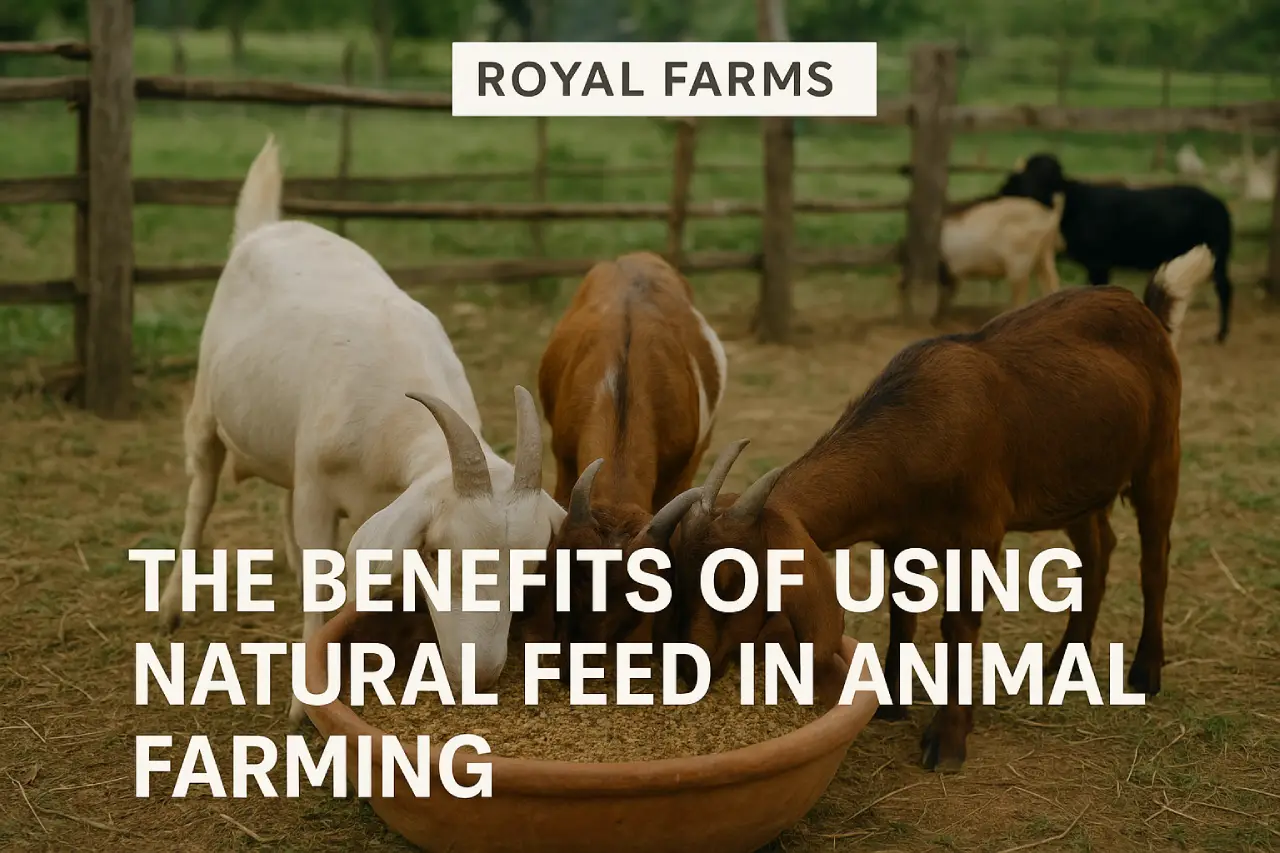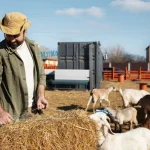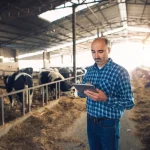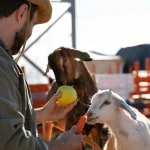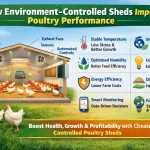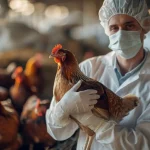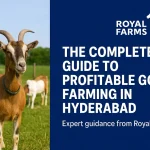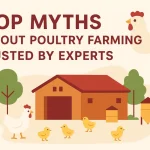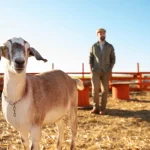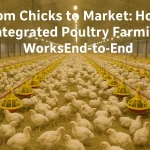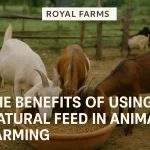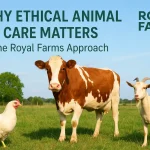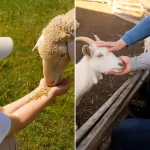At Royal Farms, we believe that feeding animals with natural, chemical-free, nutrient-rich diets is not just a choice—it’s a commitment. A commitment to healthier livestock, superior products and a sustainable future. Whether it’s our poultry, cattle or sheep & goat operations, the right feed can make all the difference. Here’s why making the switch to natural feed matters—and how it drives value for your farm, your animals and your business.
1. Enhanced Digestive Health
Table of Contents
ToggleAnimals thrive when their diet consists of wholesome, minimally processed ingredients. Natural feeds typically include whole grains, legumes, pulses and plant-based proteins without excessive synthetic additives or fillers. These types of feeds are gentler on the animal’s gut, improving digestion and nutrient absorption. When livestock process feed efficiently, they gain more from less—resulting in better overall vitality and performance. At Royal Farms, we priorities feed formulations that support gut health, thereby reducing issues like indigestion, poor uptake and slow growth.
2. Stronger Immune Systems
In livestock farming, a robust immune system is your frontline defence. Natural feeds are rich in essential vitamins, minerals, antioxidants and beneficial fatty acids that help animals resist disease, recover faster and maintain productivity. By avoiding excessive synthetic chemicals and favouring natural, balanced nutrition, animals live in a healthier state of wellness. Healthier animals need fewer interventions, fewer treatments and offer more reliable outputs. Our feed strategy at Royal Farms focuses on giving each animal the nutritional foundation it needs to stay strong and productive.
3. Improved Growth, Development & Efficiency
Whether you’re raising broiler birds, dairy cows or meat-goat stock, the right nutrition matters. Natural feeds enable better muscle development, stronger skeletal structure and healthier body condition—all key metrics for growth, productivity and profitability. Young animals especially benefit from nutrient-dense natural diets that balance amino-acids, vitamins, minerals and fibre. In our operations at Royal Farms, this approach translates into healthier herds, faster growth cycles and better feed conversion—meaning more output per unit of feed and a boost to your bottom line.
4. Higher-Quality Animal Products
When livestock are fed well, the products they generate—meat, milk, eggs—reflect that quality. Natural feed regimes contribute to better taste, richer nutritional profiles and greater consumer appeal. For example, milk from well-nourished cows can command better value; meat from goats or sheep raised on wholesome diets may show improved texture, flavour and market acceptance. At Royal Farms, we focus on feed practices that underpin product integrity—from farm to table—so that our partners and end-consumers receive produce that’s trustworthy and premium.
5. Sustainability & Environmental Responsibility
Feeding naturally isn’t solely about animal health—it also touches on environmental stewardship. Natural feeds often rely less on synthetic chemicals, fewer growth-promoting additives and lower dependency on problematic inputs. This supports healthier soils, gentler ecosystems and a reduced carbon footprint across the supply chain. By choosing natural feed, farmers align with global sustainability goals, and help build a farming future that respects both animals and the land. At Royal Farms, our integrated model emphasizes sustainable feed practices as a core pillar of our livestock systems.
6. Ethical Farming That Aligns with Consumer Values
Consumers are increasingly aware of how their food is produced—what animals are fed, how they’re treated, what the environment impact is. By adopting natural feed systems, farms demonstrate commitment to animal welfare, transparency and ethical standards. This branding matters: animals raised with care, fed naturally and allowed to live in healthy conditions resonate with conscious buyers. At Royal Farms, our ethical animal-care philosophy and natural-feed strategy go hand-in-hand, helping us build relationships with committed partners and markets who value responsibly produced livestock.
7. Market Differentiation & Business Advantage
Finally, choosing natural feed can offer a competitive edge. Products from animals raised on clean, natural diets carry value—whether it’s higher market price, stronger brand trust or access to premium segments. For farmers and businesses, this opens up new opportunities for growth, partnership and premium positioning. At Royal Farms, our integrated systems across poultry, cattle and sheep & goats emphasise this advantage—supporting our ecosystem of farmers, investors and end-users.
How to Transition Smoothly to Natural Feed
Switching to natural feed is wise—but it needs the right approach:
- Start gradually: Blend in the new feed with the existing diet over a few weeks so animals adapt.
- Consult nutrition experts: Each species (and local conditions) requires specific balances—so work with trusted advisors.
- Monitor animals closely: Watch for changes in appetite, digestion, coat condition, growth rates and general health.
- Source quality ingredients: Ensure that natural feed is genuinely chemical-free and comes from trustworthy supply chains.
- Maintain hygiene & bio-security: Even the best feed won’t perform if animals live in stressful or unhygienic conditions.
Conclusion
For any farm committed to quality, ethics and sustainability, adopting natural feed is a smart move. It’s a strategy that elevates animal health, product excellence and brand reputation—all while supporting a more responsible agricultural future. At Royal Farms, we integrate this philosophy across our poultry, cattle and sheep & goat operations: we raise animals with care, feed them naturally and deliver products you can trust.
If you’re exploring how natural feed can improve your farming venture—or how to partner with an integrated livestock model—reach out to us. Together, we can build healthier herds, stronger markets and a farming system that works for animals, for people and for our planet.

